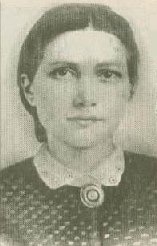Emma Sansom aids General Forrest
When Emma Sansom aided Brigadier General Nathan Forrest
In April 1863, Confederate Brigadier General Nathan Bedford Forrest was ordered into northern Alabama to pursue Union Colonel Abel Streight, who had orders to destroy the Confederate railroad near Chattanooga, Tennessee. It was the only source of supply and communications to Confederate General Braxton Bragg’s army in middle Tennessee. On May 2, 1863, Streight arrived just outside of Gadsden and prepared to cross Black Creek. Because the creek was swollen due to rain, Streight realized that if he destroyed the bridge he could get a few hours respite from the pursuit of Forrest. Seeing the nearby Sansom farmhouse, he rode upon it. The soldiers searched the farmhouse for guns and saddles, and took her brother, Rufus, prisoner. The women watched the soldiers tear down their fence rails and pile them on the bridge. One of them ran to the house. Seizing a piece of blazing coal from their fireplace, he ran to the bridge and set fire to the rails and some brush they had gathered. The flames soon soared high into the air.
The women were standing on the front porch, grieving for Rufus, when General
Forrest came into view. He asked them if there was another bridge nearby. They
told him that the closest one was at Gadsden, two miles away. Then, Emma said
that she knew of a place where she had seen cows cross, and she thought his men
might be able to cross there. She told Forrest that if one of his men would help
saddle her horse, she would show him a place that she had seen cows cross the
creek, and that he might be able to cross there. He replied that there was no
time to saddle a horse and asked her to get on his horse behind him. As they
started to leave, Emma's mother objected, but relented when Forrest assured her
that he would bring the girl back safely. Emma then directed Forrest to the spot
where he could cross the creek. Some accounts of the skirmish indicate that the
two came under fire from Union soldiers, who subsequently ceased fire when they
realized that a young girl was showing them the way. After taking Emma back to
her home, Forrest continued his pursuit of Streight.
The following day, Forrest surrounded Streight and his entire command. The
exhausted Union general reluctantly surrendered. He soon learned that his 1466
men had been captured by 322 Confederates. The Yankees were sent to Libby
Prison.
General Forrest always credited this victory to Emma. The time she saved him by directing him to the alternate crossing allowed him to continue his pursuit of Streight. The Confederate railroad so vital to the Confederacy was saved.
Earlier Forrest had asked her name and for a lock of her hair. The noise of the battle was so loud that they left and hid in a safe place. After the firing stopped, Emma started back home and met General Forrest again. He asked again for a lock of her hair and told her that one of his bravest men had been killed and was laid out in the house. His name was Robert Turner and Forrest asked that he be buried in a nearby graveyard. He also told her that he had left a her a note of thanks:
| Hed Quaters in Sadle May 2 1863 My highest regardes to miss Emma Sansom for hir Gallant conduct while my posse was skirmishing with the Federals across Black Creek near Gadsden Allabama. N. B. Forrest Brig Genl Comding N. Ala |
Emma became a heroine to the local people, especially considering that her actions were in full view of the Unionists on the other side of Black Creek. She could have later been arrested by the Union Army for openly aiding the Rebels.
At its meeting in November, the general assembly of the State donated a section of the public lands and a gold medal in consideration of her public services. The preamble of the resolutions declares that...
"A nation's history is not complete which does not record the
names, and deeds of its heroines with those of its heroes, and
revolutions sometimes throw the two in such close proximity that the
history of the manly bearing of the one is imperfect unless coupled
with the more delicate, yet no less brilliant, achievement of the
other, and such must ever be the history of the most gallant and
successful victory of the intrepid Forrest, unless embellished with
the name and heroic acts of Emma Sansom." |
